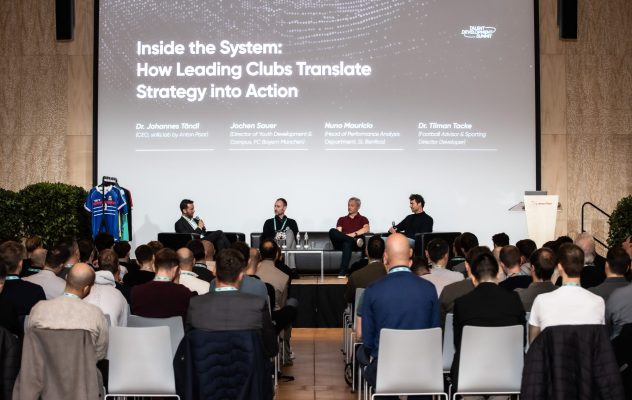



The Talent Development Summit 2025 brought together leaders in player development for two days of focused discussion and shared insight. Held again in Graz, Austria on November 11-12 and hosted by skills.lab at the Anton Paar Technology Center, the summit offered a clear focus: not size, but substance. Through expert sessions, open conversations and a shared interest in long-term development, it created space for reflection, learning and professional exchange.
Since the first edition of the event in 2024, the Summit was built around a clear goal: to create a space for people who share a passion for true, long-term player development. As CEO Johannes Tändl summarized: “We wanted to create a space for individuals in football that share our passion and vision for honest player talent development.”
That spirit was reflected in the carefully curated lineup of speakers and the depth of discussion they inspired. Over two days, keynotes and panel discussions explored data-led strategies, talent ID systems, training innovation, cognitive performance, and the cultural shifts needed to support long-term growth over short-term wins.
At the same time, the event remained grounded in something equally important: human connection. As Johannes Tändl put it: “We want people to learn from each other, and we want them to enjoy it. That’s why excellent networking is just as essential as excellent keynotes.” From lively evening meetups at the evening’s to spontaneous hallway talks, the Summit lived up to its promise: expert discussions, in an expert setting, with space for open conversations.
Over these two days, key themes emerged that reflect where football development is heading. A clear takeaway: data plays a central role, not as a replacement for coaching, but as a tool that sharpens it. When interpreted with context, data helps inform decisions, shape training plans, and support long-term development without losing sight of human judgment.
Many talks challenged traditional talent ID methods, advocating for more structured, holistic approaches, from cognitive testing to bio-banding, that look beyond physical maturity and emphasize long-term potential. Cognitive performance, in particular, stood out as a growing priority. Training environments like the skills.lab Arena were highlighted for replicating decision-making demands under pressure a key differentiator in player development.
Across clubs and organizations, a strong shift toward “plan-do-review” frameworks was evident. Development is no longer linear or reactive, it’s reflective, collaborative, and increasingly rooted in continuous learning. And above all, the importance of learning transfer was clear: it’s not just about building skills, but embedding them in real-game situations where players are encouraged to adapt, take risks and grow.
We’d like to sincerely thank all the experts who joined us on stage and shared their insight: Richard Allen (FIFA), Dr. Tilman Tacke (TILT), Nuno Maurício (SL Benfica), Jochen Sauer (FC Bayern München), Dr. Michael Senske (FC Bayern München), Paul Schaffran (Borussia Dortmund), Abdulaziz Alkhereiji (Mahd Sports Academy), Antonio Gutiérrez López (Sevilla FC), Amílcar Carvalho (KKS Lech Poznań), Steffen Barthel (TSG Research Lab), Dr. Helmut Marko (Oracle Red Bull Racing), Ben Smith (Brighton & Hove Albion), Wojciech Rokicki (Legia Training Center), Dr. Felix Proessl (Colorado Rapids) and Tim Moriau (Club NXT/Club Brugge).
Each brought a different lens, but all converged around the same point: the future of football development will be built on purposeful integration of data, science, coaching, and player experience.
That shared direction was clear throughout the event. The Talent Development Summit 2025 wasn’t just a space for reflection, it was a reminder of what’s possible when long-term thinking, smart processes and open collaboration lead the way. In a game often shaped by short-term pressures, it’s those who commit to development with clarity and conviction who will shape the future.